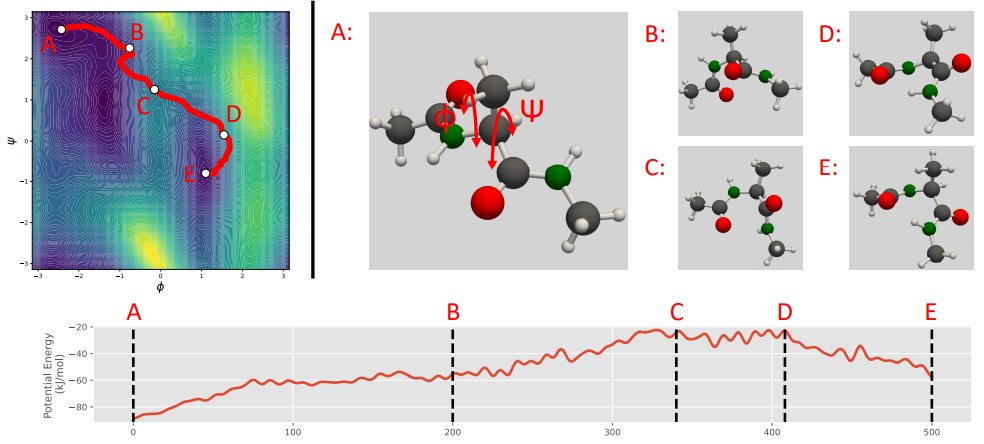Path Integral SOC for Path Sampling (PIPS)
by Lars Holdijk from Oxford University.

Topic: Stochastic Optimal Control for Collective Variable Free Sampling of Molecular Transition Paths
Abstract:
We consider the problem of sampling transition paths between two given metastable states of a molecular system, e.g. a folded and unfolded protein or products and reactants of a chemical reaction. Due to the existence of high energy barriers separating the states, these transition paths are unlikely to be sampled with standard Molecular Dynamics (MD) simulation. Traditional methods to augment MD with a bias potential to increase the probability of the transition rely on a dimensionality reduction step based on Collective Variables (CVs). Unfortunately, selecting appropriate CVs requires chemical intuition and traditional methods are therefore not always applicable to larger systems. Additionally, when incorrect CVs are used, the bias potential might not be minimal and bias the system along dimensions irrelevant to the transition. Showing a formal relation between the problem of sampling molecular transition paths, the Schrödinger bridge problem and stochastic optimal control with neural network policies, we propose a machine learning method for sampling said transitions. Unlike previous non-machine learning approaches our method, named PIPS, does not depend on CVs. We show that our method successful generates low energy transitions for Alanine Dipeptide as well as the larger Polyproline and Chignolin proteins.
| Topic | Stochastic Optimal Control for Collective Variable Free Sampling of Molecular Transition Paths |
| Slides | TBA |
| When | 12.02.24, 15:00 - 16:15 (CET) / 14:00 - 15:15 (GMT) / 09:00 - 10:15 (ET) / 07:00 - 08:15 (MT) |
| Where | https://us02web.zoom.us/j/85216309906?pwd=cVB0SjNDR2tYOGhIT0xqaGZ2TzlKUT09 |
| Video Recording | TBA |
Speaker:
Lars Holdijk is a PhD student at the University of Oxford working with Michael Bronstein, Max Welling and Bernd Ensing. His research focusses on geometric deep learning and generative models for applications in computational biochemistry. Before joining the University of Oxford, he obtained a masters degree from the University of Amsterdam under the supervision of Max Welling and Yarin Gal as part of the ELLIS MSc program. Prior to this, he worked as researcher at Porsche AG and obtained his bachelors degree in computer science from the University of Groningen. At the time his research primarily focussed on robust and interpretable machine learning.